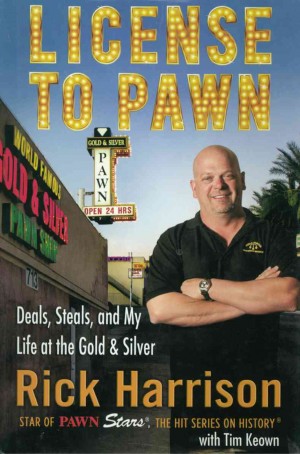
As the most fascinating pre-YouTube stories of fame and fortune go, these men were not just suddenly there. TV crews, cameras and the Vegas version of uzis did not simply stumble upon the World Famous Gold & Silver Pawn Shop.
The show has four backstories—as intertwined as the lives of these four men have long been, but each one distinct and absorbing. The tales are told with disarming candor and often surprising wit in “License to Pawn—Deals, Steals, and My Life at the Gold & Silver” (www.HyperionBooks.com).
Bylined by shop owner Rick Harrison, “License” is cowritten with New York Times best-selling author Tim Keown, who also cowrote “Bad as I Wanna Be” by basketball star Dennis Rodman and “Beyond Belief” by pro-baseball idol Josh Hamilton.
While the mood and manner are forthright and thus engaging, the book is still best evaluated for the narratives, and the insights to which it treats viewers who might, at this point, be wondering about the curious quartet behind the Gold & Silver counter. More precisely, away from it.
Old soul
Old Man, Rick says, “got the nickname when he was in his 30s because he’s always been an old soul.” Old Man’s given name is Richard Benjamin. Initially, Rick may sound a tad cheeky when talking about his father and their two other costars—Corey, his son, also called Big Hoss; and Corey’s bosom chum, Chumlee, whose real name is Austin Russell.
Russell earned the tag, Rick notes, “because he looks like a cartoon walrus.” Old Man’s family he describes as “dirt-poor white trash,” “less refined” than his mom’s. But he dedicates “License” to this man who “was always a hustler, that’s for sure,” and it soon becomes apparent that the unflinching sketches of his three partners are drawn from Rick’s unapologetic “analytical, mathematical calculating” mind, the same one he employs to full advantage at the shop.
Happily for the reader, Old Man, Big Hoss and Chumlee return the favor. The result is a spirited exchange of mutual affection/cold appraisal of one another, as when Chumlee says of the friend whose hand he held through some very bad times: “People don’t give Corey enough credit for being smart because he comes across as a hard-ass. He is a hard-ass but he’s really intelligent and earned everything [he’s got].”
Corey doesn’t sound so hard-ass talking about Chumlee: “He’s like a brother to me, maybe more than my real brother.”
Old Man takes a nick at Rick himself: “He’ll tell you he runs the store, I’ll tell you I run it.” Predictably, Old Man is the most pragmatic about the show. “Nobody thought ‘Pawn Stars’ was going to mushroom like it has. We thought we’d get a couple of years out of it and be happy.”
He admits to some jealousies within the family. “My wife can’t understand why I’m not getting [as many] personal appearances [as] the other guys. I understand—it’s demographics. A lot of older people love the show, but [the producers] are more interested in [viewers aged] 18 to 54.”
Rick, 48, and a 10th-grade dropout, is not the least shy to say he’s enjoying “seriously the greatest life I can imagine living.” The book relates his childhood bouts with epilepsy and resultant drug abuse, but also how his genius was honed and discovered. “My childhood was one long experiment in proving that smart people can do stupid things.”
A lot more fun are his anecdotes about customers through 22 years in the family business—now 24, as the book was published in 2011. “I’ve dealt with every kind of human imaginable—billionaires, pimps, celebrities, two-toothed meth addicts…” These characters thickly populate the book.
Intermittently, Rick throws in trade secrets: “Probably 60 percent of our business consists of pawns [but] on ‘Pawn Stars,’ the vast majority of the customers you see are selling. Most people who are in the position where they have to pawn something don’t want to be shown on television.”
“License” likewise ventures into aspects that the show tenaciously keeps under wraps, i.e., the women in their lives. For the record, Rick and Corey are married (Rick got hitched last July, his third time).
As for Chumlee, it turns out there’s a lot going on in that head, including a certain sadness: “[My] only regret is that my dad died about a week before the first show aired. He was proud of me.” He’s proud of himself, too. “I’m not very book smart,” he says. “But if you put me out on the street I’ll make it every time. I have common sense. I’ll take [that] over book smarts any day where I come from.”
Big Hoss never thought his life was very interesting until “Pawn Stars.” He relates—and his is our favorite before-and-after take: “I was just a big dude rolling through life… then TV showed up and everything changed. I guess I’m interesting now. I have an assistant. That’s the craziest thing. If you had told me three or four years ago that I’d have a personal assistant [one day], I would have laughed at you.”

